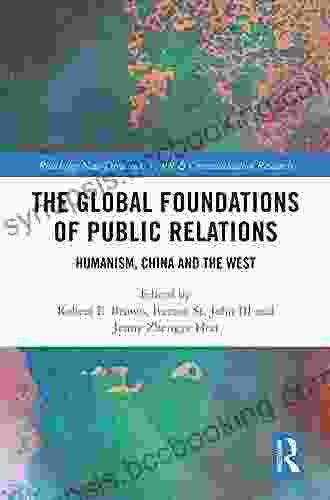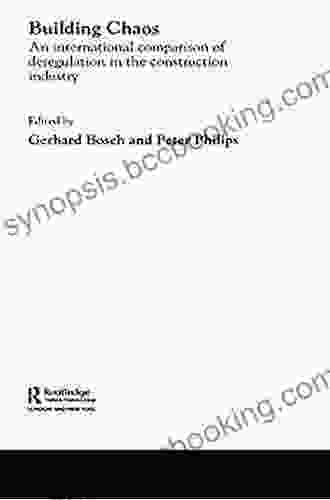An International Comparison of Deregulation in the Construction Industry

The construction industry, a cornerstone of economic development, has undergone significant transformations in recent decades. Deregulation, the reduction or elimination of government control over an industry, has emerged as a key factor shaping the industry's landscape.
4 out of 5
| Language | : | English |
| File size | : | 3577 KB |
| Text-to-Speech | : | Enabled |
| Screen Reader | : | Supported |
| Enhanced typesetting | : | Enabled |
| Word Wise | : | Enabled |
| Print length | : | 257 pages |
This article presents an international comparison of deregulation in the construction industry, examining its impact on various aspects, including economic growth, regulatory frameworks, labor markets, competition, innovation, productivity, and sustainability.
Economic Impact
Deregulation has had a profound impact on the economic performance of the construction industry. In many countries, it has led to:
- Increased competition, driving down costs for consumers.
- Greater efficiency and productivity, leading to faster project completion times.
- Enhanced innovation, as firms seek new ways to gain an edge in a competitive market.
However, deregulation can also pose challenges. For example, it may lead to:
- Reduced quality standards, if regulatory oversight is diminished.
- Increased risks for workers, if safety regulations are relaxed.
- Greater inequality, as large firms may benefit disproportionately from deregulation.
Regulatory Frameworks
Deregulation has significantly altered the regulatory frameworks governing the construction industry. In many countries, it has led to:
- The removal of barriers to entry, allowing new firms to enter the market.
- The relaxation of zoning and building codes, providing greater flexibility for developers.
- Increased reliance on self-regulation by業界 professionals.
These changes have had both positive and negative effects. On the one hand, they have fostered competition and innovation. On the other hand, they have raised concerns about the maintenance of quality standards and the protection of workers and the environment.
Labor Markets
Deregulation has had a significant impact on labor markets in the construction industry. It has led to:
- Increased flexibility in hiring and firing practices.
- Reduced unionization rates, as firms seek to lower labor costs.
- Greater reliance on temporary and subcontracted labor.
These changes have both advantages and disadvantages. On the one hand, they have increased flexibility and reduced labor costs for firms. On the other hand, they have eroded job security and benefits for workers.
Competition
Deregulation has intensified competition in the construction industry. It has led to:
- The entry of new firms, both domestic and foreign.
- Greater price competition, as firms seek to win contracts.
- Increased use of innovative and cost-effective construction methods.
Increased competition has benefited consumers by reducing costs and improving the quality of construction services. However, it has also led to increased risks for firms, as they face greater pressure to perform and innovate.
Innovation
Deregulation has fostered innovation in the construction industry. It has encouraged firms to:
- Develop new materials and technologies to reduce costs and improve efficiency.
- Embrace digital tools and Building Information Modeling (BIM) to improve project planning and execution.
- Explore sustainable construction practices to reduce environmental impact.
Innovation has led to improved construction processes, reduced project timelines, and increased sustainability. However, it also poses challenges, as firms must invest in research and development to stay ahead of the competition.
Productivity
Deregulation has boosted productivity in the construction industry. It has led to:
- Faster project completion times, due to increased efficiency and reduced regulatory delays.
- Greater use of technology, such as automation and prefabrication, to streamline processes.
- Improved coordination and collaboration between project stakeholders.
Increased productivity has reduced construction costs and allowed firms to take on larger and more complex projects. However, it also poses challenges, as firms must constantly invest in new technologies and improve their processes to maintain a competitive edge.
Sustainability
Deregulation has had a mixed impact on sustainability in the construction industry. On the one hand, it has:
- Reduced regulatory barriers to the use of sustainable building materials and practices.
- Increased competition, which has incentivized firms to adopt sustainable practices to reduce costs.
On the other hand, deregulation has:
- Weakened environmental regulations, which can lead to increased pollution and environmental degradation.
- Reduced government funding for sustainable construction projects, which can limit the adoption of sustainable practices.
The impact of deregulation on sustainability is complex and requires careful consideration to ensure that environmental concerns are adequately addressed.
Deregulation has had a profound impact on the construction industry worldwide. It has led to increased competition, innovation, and productivity. However, it has also posed challenges, such as reduced quality standards, increased risks for workers, and greater inequality.
As countries consider further deregulation, it is crucial to carefully weigh the potential benefits and risks. A balanced approach that fosters competition and innovation while maintaining safety, quality, and environmental standards is essential to ensure the long-term sustainability and success of the construction industry.
4 out of 5
| Language | : | English |
| File size | : | 3577 KB |
| Text-to-Speech | : | Enabled |
| Screen Reader | : | Supported |
| Enhanced typesetting | : | Enabled |
| Word Wise | : | Enabled |
| Print length | : | 257 pages |
Do you want to contribute by writing guest posts on this blog?
Please contact us and send us a resume of previous articles that you have written.
 Book
Book Novel
Novel Page
Page Chapter
Chapter Text
Text Story
Story Genre
Genre Reader
Reader Library
Library Paperback
Paperback E-book
E-book Magazine
Magazine Newspaper
Newspaper Paragraph
Paragraph Sentence
Sentence Bookmark
Bookmark Shelf
Shelf Glossary
Glossary Bibliography
Bibliography Foreword
Foreword Preface
Preface Synopsis
Synopsis Annotation
Annotation Footnote
Footnote Manuscript
Manuscript Scroll
Scroll Codex
Codex Tome
Tome Bestseller
Bestseller Classics
Classics Library card
Library card Narrative
Narrative Biography
Biography Autobiography
Autobiography Memoir
Memoir Reference
Reference Encyclopedia
Encyclopedia Nicole Porter Ekdahl
Nicole Porter Ekdahl Gary Gibson
Gary Gibson Lori Mikeska
Lori Mikeska Dr Tamecca Rogers
Dr Tamecca Rogers Geryn Childress
Geryn Childress George Behe
George Behe Matthew Rake
Matthew Rake George S Day
George S Day Jonathan Brabrand
Jonathan Brabrand Patricia Leavy
Patricia Leavy Gertrude Stein
Gertrude Stein Kareem Rosser
Kareem Rosser Mjg Education
Mjg Education Frank Berrios
Frank Berrios David Rebedew
David Rebedew Gena Showalter
Gena Showalter Mantak Chia
Mantak Chia Dr Ron M Horner
Dr Ron M Horner Gilad Segev
Gilad Segev Monica L Miller
Monica L Miller
Light bulbAdvertise smarter! Our strategic ad space ensures maximum exposure. Reserve your spot today!

 Edwin BlairFinancial Strategies To Own Your Future: A Comprehensive Guide to Achieving...
Edwin BlairFinancial Strategies To Own Your Future: A Comprehensive Guide to Achieving... Edwin BlairFollow ·6.1k
Edwin BlairFollow ·6.1k Terence NelsonFollow ·6.6k
Terence NelsonFollow ·6.6k Michael ChabonFollow ·3.7k
Michael ChabonFollow ·3.7k Asher BellFollow ·3.3k
Asher BellFollow ·3.3k Pete BlairFollow ·13.6k
Pete BlairFollow ·13.6k Victor HugoFollow ·5.1k
Victor HugoFollow ·5.1k Jaden CoxFollow ·7.1k
Jaden CoxFollow ·7.1k Jamison CoxFollow ·4k
Jamison CoxFollow ·4k

 Robert Heinlein
Robert HeinleinUnveiling Humanism in China and the West: A Journey...
In our rapidly...

 Brian Bell
Brian BellBlind Boy's Unwavering Struggle Against Abuse and the...
In the tapestry of...

 Craig Carter
Craig CarterBuilding Wealth While Working for Uncle Sam: The Ultimate...
## ### Are you a federal employee who wants...

 Raymond Parker
Raymond ParkerUnveiling the Secrets of Arabic Survival: The Ultimate...
Embarking on a journey to unravel the...
4 out of 5
| Language | : | English |
| File size | : | 3577 KB |
| Text-to-Speech | : | Enabled |
| Screen Reader | : | Supported |
| Enhanced typesetting | : | Enabled |
| Word Wise | : | Enabled |
| Print length | : | 257 pages |














